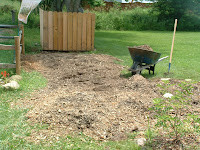‘Tis a gift to be simple,
‘Tis a gift to be free,
‘Tis a gift to come down where we ought to be,
and when we find ourselves in the place just right,
‘Twill be in the valley of love and delight.
When true simplicity is gained,
to bow and to bend we shan’t be ashamed.
To turn, turn, will be our delight,
‘Till by turning, turning we come ’round right.
Those are the lyrics to an old Shaker folk tune, written in 1848 by Elder Joseph Brackett while he lived in the Shaker community in Alfred, Maine.
I have been considering these lyrics for some time now, pondering their message. They seem more poignant as I consider what homesteading really means to me and my family.
I have been watching as the body of Christ has strayed away from God, and striving for his way, as our world has grown more and more complex. Sadly, it has become difficult to spot a christian today. We have become so worldly, there is little difference between the people of God and non-believers other than where we park our cars on Sunday.
We have set our hearts on achieving what the world defines as valuable, and have put aside the ways of the Lord. Christians today are more concerned about the performance of their 401k then they are about laying up treasures in heaven. We also have developed a case of the “I wants” as bad as our unbelieving neighbors. This worldly focus has us chasing big screen televisions, new cars, bigger homes, elaborate vacations, and a life of leisure, as much as any of the pagan fellows we pass on our way through the store’s glass doors on “black friday”.
We eagerly follow our favorite television shows, know every name and stats of every player on our favorite sports team, yet we can’t navigate our way through the books of the Bible, let alone give good explanations of the doctrines we believe.
The writer of the book of Hebrews felt this same frustration around 67 A.D. when he had to stop his dissertation on Melchizedek because he realized his audience couldn’t understand the point. They had been christians for 20 to 30 years but he said; “…though by this me you ought to be teachers, you need someone to teach you the elementary truth’s of God’s word all over again. You need milk, not solid food!” Hebrews 6:12 (NIV).
The Barna research group has done some polling on modern Christianity. His survey’s show some disturbing trends. I have attached a link to the Barna information. http://www.barna.org/barna-update/article/18-congregations/103-barnas-annual-tracking-study-shows-americans-stay-spiritually-active-but-biblical-views-wane
I realize I am painting with a broad brush, however, God has burdened my heart regarding this issue. I fear we have become the Laodicean church spoken of in Revelation 3:14-21. Jesus had harsh rebukes for that church that resonate today; “You say, ‘I am rich; I have acquired wealth and do not need a thing.’ But you do not realize that you are wretched, pitiful, poor, blind, and naked.” Revelation 3:17 (NIV).
Christ also had a dire warning for that church, reminding them that God will not allow us to be cavalier in our faith and ignore him for very long. He will discipline his church as a father disciplines a wayward child.
I want to use this blog to call the Church back to simpler, humble lives. I intend to explore how God intended his Church and his children to live.
I plan to do this using God’s own word as a guide. I want to avoid drifting into legalism and lists of do’s and don’ts. We have freedom in Christ by his death and resurrection. I want, rather, to start developing an understanding of what the prophet meant when he said; “…to walk humbly with your God.” Micah 6:8b (NIV). I wish to rediscover how to live simply and worship with a simple faith.
In Christ,
Todd










